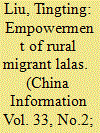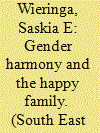|
|
|
Sort Order |
|
|
|
Items / Page
|
|
|
|
|
|
|
| Srl | Item |
| 1 |
ID:
186850


|
|
|
|
|
| Summary/Abstract |
Departing from the prevailing, individualist perspective of freedom, emphasizing individuals’ independence and the maximization of self-interest via unconstrained decision-making, this article applies the concepts of practised freedom and relational autonomy to explore the lived experience of Chinese rural-to-urban migrant gay men. Drawing on our ethnographic fieldwork in the ‘urban villages’ (城中村) of South China, we examine the ways in which rural migrant gay men achieve a sense of freedom, which is dependent on rural-to-urban migration, informal manufacturing jobs, and other queer peers, thus demonstrating a certain level of relational autonomy. Our article clearly shows how these men have come to identify as homeless guabi (挂逼, local slang for those who suffer a tragic and mysterious fate) and spend their days wandering, with no interest in stable work or long-term monogamous relationships. Our research offers a first-hand anthropological account of young adults from the rural working classes who prefer to ‘lie flat’ (躺平) – they refuse to strive for upward social mobility because they believe that upward social mobility is unattainable and a factory job too taxing.
|
|
|
|
|
|
|
|
|
|
|
|
|
|
|
|
| 2 |
ID:
167386


|
|
|
|
|
| Summary/Abstract |
In today’s China, women’s social roles continue to be rigidly associated with gender-based responsibilities that include defending the integrity of their family, entering into heteronormative marriage, and showing reproductive capabilities. Most of those who self-identify as lalas (lesbians) struggle with such issues as self-shaming emotions, disclosing their homosexuality to family members, friends, or colleagues, and dealing with family and social pressures. Within this context, I investigate queerness in a group of young Chinese rural migrant lalas working and living in the industrial area of the Pearl River Delta economic zone in South China. I draw two conclusions. First, rural-to-urban labour migration empowers rural female lalas by providing a measure of economic independence and an escape from patriarchal and homophobic family relations. Second, the integration of traditional (offline and face-to-face) socializing locations and emerging virtual communicative spaces plays an important role in the process through which possibilities of living a queer life are carved out.
|
|
|
|
|
|
|
|
|
|
|
|
|
|
|
|
| 3 |
ID:
138499


|
|
|
|
|
| Summary/Abstract |
A renewed global emphasis on ‘traditional culture’ threatens progress in women’s and sexual rights. This article focuses on Indonesia, where concepts such as ‘gender harmony’ and ‘the happy (Muslim) family’ have become state policy and where neo-Salafism is gaining ground. Indonesia’s first President, Sukarno, who managed to balance the army, Communism and Islam, was swept away during the period of mass murder in 1965–67 in which the Communist Party was destroyed. The struggle for women’s rights, as represented by the Communist-affiliated mass women’s organization Gerwani, became associated with sexual licentiousness through the slander campaign waged against the organization by the army. During the military dictatorship of Suharto, political Islam was allowed to grow. After the fall of Suharto, which introduced the so-called Reformasi period (from 1998), conservative Muslim forces gained control over important institutions. They strengthened a backward interpretation of women’s position in society. While a discourse of women’s rights prevailed after 1998, this has since been replaced by a heteronormative discourse on the ‘harmonious family’, in which women are assigned a subordinate position. The Ministry of Women’s Empowerment and Children’s Protection actively promotes this concept (at the global level too), asserting that it aims to reduce domestic violence. With the help of a discourse analysis of some key official documents, the passionate aesthetics underlying this emphasis on the reintroduction of patriarchal heteronormativity in Indonesia are exposed. Regrettably, the United Nations Population Fund supports the Indonesian Ministry on this path.
|
|
|
|
|
|
|
|
|
|
|
|
|
|
|
|
|
|
|
|
|